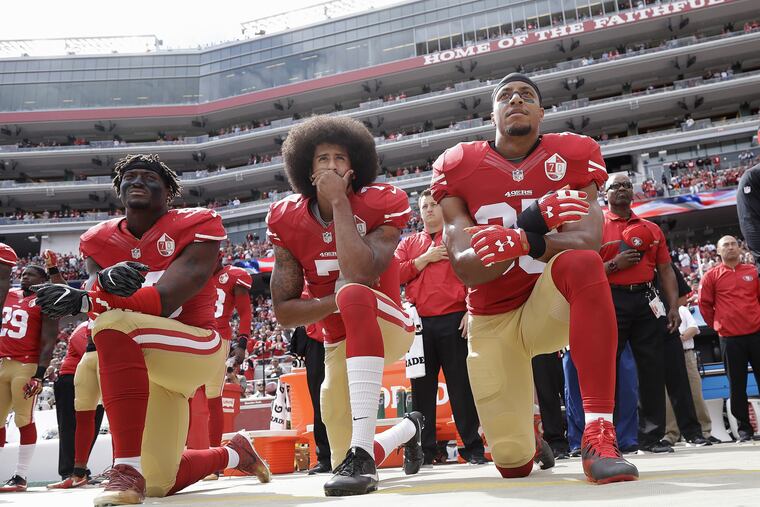Ryan Pownall’s homicide charge is the change Colin Kaepernick knelt down for | Solomon Jones
Ryan Pownall, a white former police officer, was charged in the shooting death of David Jones, a black man who was shot in the back while fleeing a stop in 2017.

Colin Kaepernick is a hero who protested racial injustice, and in doing so sacrificed his NFL career.
And though the former San Francisco 49ers quarterback has now gained a reprieve of sorts after Nike selected him as one of the faces of the company's new advertising campaign, Kaepernick's reappearance on the national stage has spurred a new round of animus.
Some white conservatives and their allies are burning their Nike paraphernalia.
Others are cutting Nike logos from their clothes.
They are doing so, they say, because Nike has embraced a man whose protest disrespected America's military and its flag. It is a view shared by President Trump, who called players who copied Kaepernick's protest "sons of bitches" who should be fired.
But in my view there is a much simpler explanation for the anger now being targeted at Nike: Kaepernick spoke up against the systematic racial oppression that is present in American policing, and Kaepernick's protest brought about change.
On Tuesday in Philadelphia, that change was evident.
Ryan Pownall, a white former police officer, was charged in the shooting death of David Jones, a black man who was shot in the back while fleeing a stop in 2017. Pownall, who had shot another black man in the back in 2010, paralyzing him, faced no criminal charges in that previous shooting.
Many have put their lives and their bodies on the line to protest police shootings in recent years. Some are Black Lives Matter protesters, such as Philadelphia's Asa Khalif, who led a group of protesters to Pownall's home. Others — nameless and faceless people from across the racial spectrum — confronted authorities in cities such as Ferguson, Mo., and Minneapolis, when other police shootings took place.
Kaepernick, however, stood out among those who chose to protest. He was a quarterback in a league where blacks are seldom allowed to play that position of leadership. That's why, in August 2016, when Kaepernick sat down during the national anthem, reporters sought him out to find out why.
"I am not going to stand up to show pride in a flag for a country that oppresses black people and people of color," Kaepernick told the NFL Network after the game. "To me, this is bigger than football, and it would be selfish on my part to look the other way. There are bodies in the street and people getting paid leave and getting away with murder."
The initial response to Kaepernick's actions — from the San Francisco 49ers, then-coach Chip Kelly, and the NFL–was that Kaepernick was within his rights to sit down. After all, there was no rule mandating that players stand. And even after Kaepernick adjusted his protest — kneeling instead of sitting in order to be more respectful of the flag — his protest was met with uneasy acceptance.
But then the protest began to spread, and its impact began to grow.
"The visibility of an African American quarterback in America's favorite sport taking a stand for racial justice and for criminal justice reform was moving to millions of people across the country," the Rev. Gregory Holston of the activist group POWER told me in an interview. "It motivated other NFL players to take a stance. Even our own Philadelphia Eagles and Malcolm Jenkins and his continued work on criminal justice reform added so much to the movement and energized activists across this country so we could get this victory today of having this police officer charged."
Holston is right. Kaepernick, arguably one of the NFL's most high-profile players, was an important voice in the call for justice. And I would argue that Kaepernick's voice began effecting change even before Pownall was charged in Philadelphia.
Last month, Texas police officer Roy Oliver was convicted and sentenced to 15 years in the murder of unarmed black teen Jordan Edwards. He was just the second police officer since 2005 to be convicted of murder as a result of an on-duty shooting. The other was Michael Slager, a South Carolina police officer who shot and killed Walter Scott, a 50-year-old black man who was unarmed when he fled a car stop. Slager was convicted in 2017 and sentenced to 20 years.
But America will not easily let go of the racial violence that is too often present in policing. That's why Trump's rhetorical attacks against Kaepernick and others have been so effective in splitting Americans on the need for justice and change.
Many Americans feel that the police are in place to maintain a system of white supremacy.
Kaepernick knelt because he believed differently. And as Nike so succinctly states in its new advertising campaign, Kaepernick is a man who wants to "Believe in something. Even if it means sacrificing everything."
Solomon Jones is the author of 10 books. Listen to him weekdays from 10 a.m. to noon on Praise 107.9 FM. sj@solomonjones.com @solomonjones1